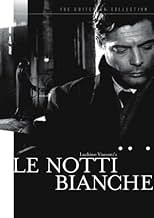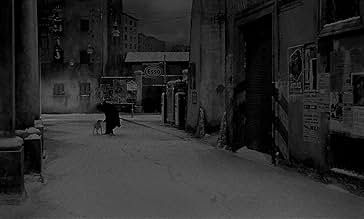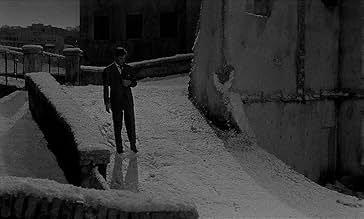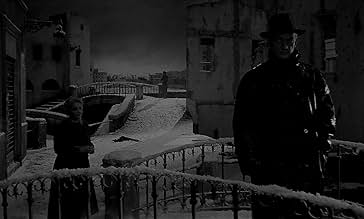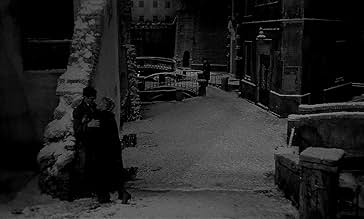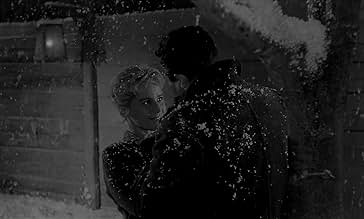IMDb RATING
7.7/10
9.7K
YOUR RATING
A humble clerk courts a woman who awaits her lover's return night after night.A humble clerk courts a woman who awaits her lover's return night after night.A humble clerk courts a woman who awaits her lover's return night after night.
- Director
- Writers
- Stars
- Awards
- 7 wins & 7 nominations total
Maria Zanoli
- La domestica
- (as Maria Zanolli)
Dirk Sanders
- Il ballerino
- (as Dick Sanders)
Giorgio Albertazzi
- L'inquilino
- (uncredited)
- …
Lys Assia
- La cantante
- (uncredited)
Alberto Carloni
- Il locandiere
- (uncredited)
Dino D'Aquilio
- Un ragazzino
- (uncredited)
Enzo Doria
- Il marinaio che balla
- (uncredited)
- Director
- Writers
- All cast & crew
- Production, box office & more at IMDbPro
Featured reviews
10Gigi-83
"The white nights" is a very fragile exquisite tale based on story of Dostoievsky. With the images extremely beautiful it tells the story of an ordinary young man Mario, who met an unusual, like from another century girl, fell in love with her and almost made her fall in love too and then lost her forever. Here two different worlds collide unambiguously - the modern, cold, indifferent stylized world and the old, more intimate and hearty one, and this collision makes many ironical and sad situations. Mastroiani plays one of his best role and looks like a real melancholic looser, Shell is eccentric, touching and gentle with her little hat and ridiculous gorgette ( dresses made by Piero Tosi seems to be the another participants of performance, so nice and expressive they are). Marais seems imperturbable like always and looks very mysteriously, a kind of fatal personage, incarnation of doom. In general film is very nice, gently and by the end tear-wringing (that's not bad indeed) and Visconti with his talent of turning usual realistic details into symbolic made this story even more beautiful then in a book.
I watched the film many times and thought that the film has been shot at Venezia.
Now I'm wathching the film again and saw some street names, like these : Scali delle pietre, Scali del Pesce etc. I began to search these names and found that the film location is not Venezia,but it is Livorno.
If you pay attention the street names or place in the film, you could find same location in Livorno. There is very little changes after 60 years.
If you pay attention the street names or place in the film, you could find same location in Livorno. There is very little changes after 60 years.
In a cold night, the lonely ordinary man Mario (Marcello Mastroianni) is wandering along the empty streets of Livorno after spending the day with the family of his employer. While crossing a bridge, Mario sees a beautiful woman crying and he starts a conversation with her. The reluctant Natalia (Maria Schell) finally accepts his companion to walk her home and they schedule to meet each other on the next day at the same place at 10:00 PM. The romantic and naive Natalia tells Mario that she is Slav and lives with her grandmother. They survive repairing fancy carpets and renting a room in their house. When an unknown tenant (Jean Marais) rents the room, Natalia immediately falls in love with him. However, the man asks for one year apart to raise enough money to get married with her and promising to return and meet her on the bridge where Mario met her in the previous night. She gives a letter to Mario to deliver to the stranger but Mario throws it away in the canal. On the next night, Natalia meets Mario by chance and they spend the snowing night together, dancing, chatting and drinking, and Mario falls in love with her; but while walking back home, the couple sees a man alone on the bridge.
"Le Notti Bianche" is one of the most beautiful romances I have ever seen. The melancholic, utopist and timeless love story is a different film from the genius Luchino Visconti, based on the novel by Fyodor Dostoyevsky, and was shot in magnificent sets that rebuilt a non- faithful quarter of Livorno in the Cinecittá in the opposite direction of the Italian Neo-Realism. The chemistry between Marcello Mastroianni in one of his best roles and the gorgeous and sweet Maria Schell with her delightful smile in the role of a dreamer is amazing and one of the greatest attractions of this lovely film. The haunting cinematography in black and white is comparable to the German Expressionism with the use of lighting and shadows. Last but not the least, the unforgettable music score of Nino Rota completes this stunning and unknown masterpiece. The DVD released in Brazil by Versátil Dstributor has restored images and perfect sound that highlight the wonderful cinematography. My vote is ten.
Title (Brazil): "Noites Brancas" ("White Nights")
"Le Notti Bianche" is one of the most beautiful romances I have ever seen. The melancholic, utopist and timeless love story is a different film from the genius Luchino Visconti, based on the novel by Fyodor Dostoyevsky, and was shot in magnificent sets that rebuilt a non- faithful quarter of Livorno in the Cinecittá in the opposite direction of the Italian Neo-Realism. The chemistry between Marcello Mastroianni in one of his best roles and the gorgeous and sweet Maria Schell with her delightful smile in the role of a dreamer is amazing and one of the greatest attractions of this lovely film. The haunting cinematography in black and white is comparable to the German Expressionism with the use of lighting and shadows. Last but not the least, the unforgettable music score of Nino Rota completes this stunning and unknown masterpiece. The DVD released in Brazil by Versátil Dstributor has restored images and perfect sound that highlight the wonderful cinematography. My vote is ten.
Title (Brazil): "Noites Brancas" ("White Nights")
In some ways, "Le Notti Bianche" is a strange film for me. On one hand, it has some of the best cinematography you'll ever see in a black & white film. The composition, the lighting, the mist--it all is so perfect. Yet, on the other hand, the story itself is so slight that I felt very unfulfilled at its conclusion.
The film begins with a lonely man wandering about the waterfront late at night. Although you'd think a guy that looks like Marcello Mastroianni would not have trouble finding a relationship, but in this film he is quite alone. By chance, he meets a very strange woman (Maria Schell). She is VERY shy--and behaves a bit oddly. However, despite this, he vows to stop by the same place they met and see her, if she wants, the following night. From this very inauspicious beginning, two lonely people meet and form a friendship....and perhaps more. Eventually, you understand some of her weird behaviors--she's actually waiting for another man (Jean Marais)--a man who you assume will never come.
There really is NOT a lot more to the film than my description. It isn't a bad film but I wanted more. I liked Mastroianni's character (though he was a sad fellow) but found Schell's perplexing and hard to believe. I also thought their relationship a bit hard to believe as well--going from total strangers to talking about marriage WAY too fast. In fact, the story itself was only okay--but the film earns a 7 simply for its look. Not a particularly enjoyable or engaging film for me--and it receives a very, very mild recommendation from me.
The film begins with a lonely man wandering about the waterfront late at night. Although you'd think a guy that looks like Marcello Mastroianni would not have trouble finding a relationship, but in this film he is quite alone. By chance, he meets a very strange woman (Maria Schell). She is VERY shy--and behaves a bit oddly. However, despite this, he vows to stop by the same place they met and see her, if she wants, the following night. From this very inauspicious beginning, two lonely people meet and form a friendship....and perhaps more. Eventually, you understand some of her weird behaviors--she's actually waiting for another man (Jean Marais)--a man who you assume will never come.
There really is NOT a lot more to the film than my description. It isn't a bad film but I wanted more. I liked Mastroianni's character (though he was a sad fellow) but found Schell's perplexing and hard to believe. I also thought their relationship a bit hard to believe as well--going from total strangers to talking about marriage WAY too fast. In fact, the story itself was only okay--but the film earns a 7 simply for its look. Not a particularly enjoyable or engaging film for me--and it receives a very, very mild recommendation from me.
Fyodor Dostoyevsky is a writer I've gotten into heavily recently, and I couldn't be happier to have seen Luchino Visconti's adaptation of his short story (not yet read by me) as the first. The very essential, human search for happiness with a one true love, that those who may not have much money may at least find some kind of relief from the world in each other's company, is at the heart of Dostoyevksy's stories. And while often filled with sorrow, decay, and with enough melodrama to sink a ship, this spirit is then given catharsis when the good that comes in through the dark times it's something to really cling to. Visconti has his own style already taking on Dostoyevsky's work, and I wondered going into it if the director of another great adaptation, Ossessione, could pull it off. For me, it may even be better than that film; Le Notti Bianche gives us characters who are not overly complicated or with nefarious desires. If anything, these are the kinds of characters that I wish were in movies more often, flaws and all.
Marcello Mastroianni is also, for me, a really pleasant surprise seeing him in this film. Regrettably the only films I've seen him in are the early ones he made with Fellini, where his persona is cool, detached, and he could do his ultra suave &/or depressed and unchained characters effortlessly. With the character of Mario, Mastroianni is playing just an ordinary guy, with a low paying job and nothing special going for him in life. But if nothing else he is what most women in real life would look for in men, with compassion, sensitivity, but also sensible and with some of the minor flaws of being a nice guy. With the character of Natalia, Mario meets a woman whom he falls for hard, and wants to see again after a chance encounter. Maria Schnell is perfect against Mastroianni, as she has that kind of face and look in her eye (for lack of a better comparison) of any given American melodrama, only a bit more genuine. She's basically been waiting, as she tells, for a year for the man who will whisk her away from all of her troubles. But will he? Will Mario come through on a letter? What happens through the course of an unsure night?
Visconti poises these two against a backdrop completely staged, brilliantly in fact, and shot by the great Giussepe Rotunno with the kind of visual splendor that in its own way is on par with Visconti's the Leopard. It's not filmed in the real world, and the melodrama in the film is that of a very cinematic- or maybe theatrical- nature, but because it's an ultimately believable one the atmosphere gets heightened. Topped with Nino Rota's elegant score, many a wide shot shows Mario and Natalia on their walks along the streets, and then the close-ups work just as well. Best of all is a quasi ice breaker of Visconti's by doing a dance number in a bar, adding a sweet, if dated, levity that acts as the last mark before the story turns, and turns some more. What drew me in most about Le Notti Bianchi is how Visconti makes this a story of pure emotions, but one that is not at all sappy or trashy or whatever. Like with many of Dostoyevsky's characters, even through their misguided wants and feelings and the sense of anguish that may come to them (or not), we care about them. If ever a director, who started in neo-realistic roots, took a 180 and made it just as dramatically satisfying, it's here. One of the best films of 1957.
Marcello Mastroianni is also, for me, a really pleasant surprise seeing him in this film. Regrettably the only films I've seen him in are the early ones he made with Fellini, where his persona is cool, detached, and he could do his ultra suave &/or depressed and unchained characters effortlessly. With the character of Mario, Mastroianni is playing just an ordinary guy, with a low paying job and nothing special going for him in life. But if nothing else he is what most women in real life would look for in men, with compassion, sensitivity, but also sensible and with some of the minor flaws of being a nice guy. With the character of Natalia, Mario meets a woman whom he falls for hard, and wants to see again after a chance encounter. Maria Schnell is perfect against Mastroianni, as she has that kind of face and look in her eye (for lack of a better comparison) of any given American melodrama, only a bit more genuine. She's basically been waiting, as she tells, for a year for the man who will whisk her away from all of her troubles. But will he? Will Mario come through on a letter? What happens through the course of an unsure night?
Visconti poises these two against a backdrop completely staged, brilliantly in fact, and shot by the great Giussepe Rotunno with the kind of visual splendor that in its own way is on par with Visconti's the Leopard. It's not filmed in the real world, and the melodrama in the film is that of a very cinematic- or maybe theatrical- nature, but because it's an ultimately believable one the atmosphere gets heightened. Topped with Nino Rota's elegant score, many a wide shot shows Mario and Natalia on their walks along the streets, and then the close-ups work just as well. Best of all is a quasi ice breaker of Visconti's by doing a dance number in a bar, adding a sweet, if dated, levity that acts as the last mark before the story turns, and turns some more. What drew me in most about Le Notti Bianchi is how Visconti makes this a story of pure emotions, but one that is not at all sappy or trashy or whatever. Like with many of Dostoyevsky's characters, even through their misguided wants and feelings and the sense of anguish that may come to them (or not), we care about them. If ever a director, who started in neo-realistic roots, took a 180 and made it just as dramatically satisfying, it's here. One of the best films of 1957.
Did you know
- TriviaAustrian actress Maria Schell learnt the script in Italian and spoke all her lines in Italian during the shooting, which won her the admiration of the Italian cast and crew. It was subsequently decided not to dub her voice by an Italian actress, which was the usual practice at the time.
- Goofs(at around 4 mins) When the bar closes and the owner exits it, he pretends to take out keys from his pocket to lock the door. But, as the camera moves away, the actor portraying the owner of the bar, can be seen putting the keys back in his pocket without locking the door.
- ConnectionsEdited into Meine Schwester Maria (2002)
- SoundtracksThirteen Women
Written by Dicky Thompson (as Thomson), Gadda and Lidianni
Decca Records Inc. New York U.S.A.
Performed by Bill Haley and the Comets (as Bill Haley and His Comets)
- How long is White Nights?Powered by Alexa
Details
- Release date
- Countries of origin
- Language
- Also known as
- Nuits blanches
- Filming locations
- Production companies
- See more company credits at IMDbPro
Box office
- Gross worldwide
- $6,497
- Runtime
- 1h 42m(102 min)
- Color
- Sound mix
- Aspect ratio
- 1.66 : 1
Contribute to this page
Suggest an edit or add missing content

![Watch Trailer [OV]](https://m.media-amazon.com/images/M/MV5BZDE1MmJhZTctZDhhNC00ZmYxLTgzYmQtODc4ZTE1YTM3NTAxXkEyXkFqcGdeQXRyYW5zY29kZS13b3JrZmxvdw@@._V1_QL75_UX500_CR0)
